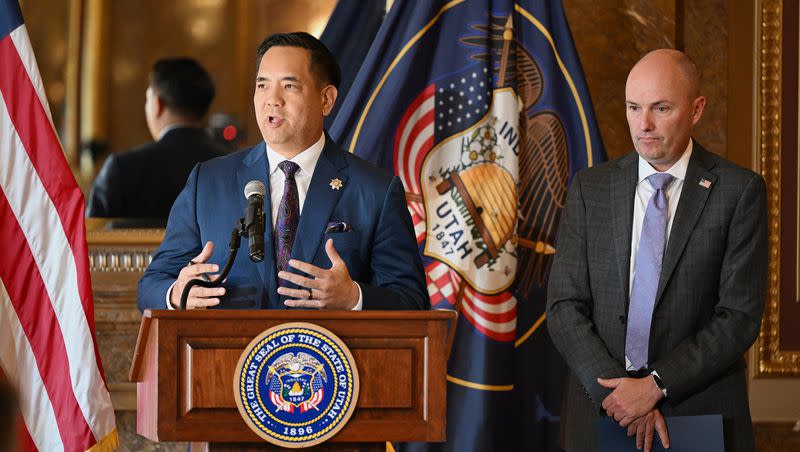Opinion: Should Utah take away your ability to elect the attorney general?

- Oops!Something went wrong.Please try again later.
- Oops!Something went wrong.Please try again later.
When Sean Reyes announced last week he wasn’t running for reelection as Utah’s attorney general, he did more than just open the seat to fierce political competition. He reignited an old debate over whether the state should continue electing people to that office.
Get ready. If this gains any traction, and if you’re a registered voter, this one could be on a ballot near you someday soon. Something this big would require a change in the state constitution, which ultimately would require a public vote.
Reyes’ decision not to run comes at a time of intense scrutiny over his relationship with anti-trafficking activist Tim Ballard, who is being sued over allegations of sexual harassment and assault. State lawmakers have ordered an audit into the governance and oversight of the attorney general’s office.
Although Reyes is not resigning, he is the third Utah attorney general in a row to be plagued by troubles, though it’s important to note that the other two — Mark Shurtleff and John Swallow — were eventually exonerated. In Shurtleff’s case charges were dropped, and, in Swallow’s case, he was acquitted by a jury.
State Sen. Mike McKell, R-Spanish Fork, is waiting to see the results of the audit of the attorney general’s office before doing anything, but he may sponsor a bill to change the nature of the office, letting the governor choose the attorney general, with the advice and consent of the Legislature.
His strongest argument? It has nothing to do with Reyes and everything to do with the nature of the office. It’s the same argument Utah has relied on historically for not electing judges.
Related
“(Judges) would have to raise money and campaign for support from people who might go before the court some day,” he told me. “This is the same problem we have with the attorney general. He has to raise money from wealthy corporations and high-powered people who fund his campaigns.” This could present conflicts for any attorney general who makes decisions concerning which cases to pursue.
He said too much confusion exists over who the attorney general represents. “The client is the state of Utah,” he said. While allowing for some prosecutorial discretion, “I cringe when folks say the attorney general should have some independence. Independence from what?”
An appointment process would allow the governor to interview and select an excellent attorney, rather than rely on an election process that tends to attract people with political ambitions. It would put a laser focus on the attorney general’s obligation to represent the state, he said. If that person is involved in improprieties, the governor could fire him or her. No more waiting for the next election.
It also would place Utah among a small minority of states that appoint, rather than elect, their attorneys general. Only five states let the governor appoint the office, while in Maine, the Legislature makes the appointment, and in Tennessee, the Supreme Court does it.
That’s according to the Ballotpedia website, which also describes the duties of a state attorney general as “to serve as chief legal adviser to the agencies and legislative bodies that make up his or her state’s government, in addition to the citizens residing within the state.”
It’s that “addition” that makes this issue complicated.
In the federal government, the president appoints the attorney general. That has not eliminated problems. Presidents and governors hold partisan political offices. Their appointments often are made with a nod to partisan loyalty. John F. Kennedy appointed his younger brother to the job. Donald Trump fired Jeff Sessions for recusing himself from an investigation into Russian influence on the administration. Even George Washington used his attorney general to advise him on dealing with Congress.
The website Theconveration.com quotes Georgetown law professor Susan Low Bloch, who wrote that “from the beginning there were questions about whom the attorney general represented, who should and would control the incumbent attorney general, and what it means to represent the ‘interests of the United States.’”
Some have argued that Americans ought to be allowed to elect the nation’s attorney general.
As with so many things in government, there is no perfect solution.
My guess is that if Sen. McKell does decide to sponsor an effort to make this change, it would face an uphill climb. The recent string of problems may make a change attractive, but many people still would see it as an effort to take power away from Utah voters, and that’s a tough sell.

